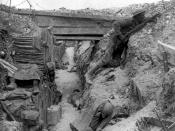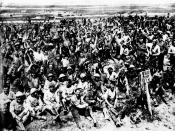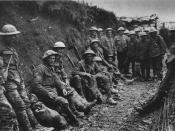World War one and its Aftermath
With reference to at least two of your sources and using your own knowledge explain how and why attitudes of civilian populations of Britain and German towards the war changed between 1914 and 1918.
Many people were enthusiastic about war when fighting began. While men rushed off to join the army, civilians who stayed at home were infected by war fever. Crowds in every country waved flags, sang patriotic songs, gave money for the war efforts, and eagerly read every detail of battles in their local newspapers. Until the battle of the Somme, many soldiers were excited at the prospect of war. They saw it as an opportunity for adventure, and to defend their country, the innocent and weak for a noble cause. On the Home Front, civilians were very supportive of war. Letters coming home from men were censored, so those on the home front were unaware of the horrors and dreads the soldiers were facing.
After the battle of the Somme in July 1916, where there were one million casualties, support for the war reduced, as the casualties listings in papers increase. On the German side, support lasted much longer, as it looked like the Germans were close to winning the war. However after " The Turnip Winter, the German home Front lost faith in the war. Both sides were facing food shortages, and weakening defences after severe losses of soldiers. There was also an increase of Women in mens jobs, both in Germany and Britain. Civilians were feeling a loss of freedom and attitudes to the war began changing.
The war reduced everybody's freedom. The Defence of the Realm Act (DORA) allowed the government to do almost anything it wanted. It could take away a persons land or censor the...


